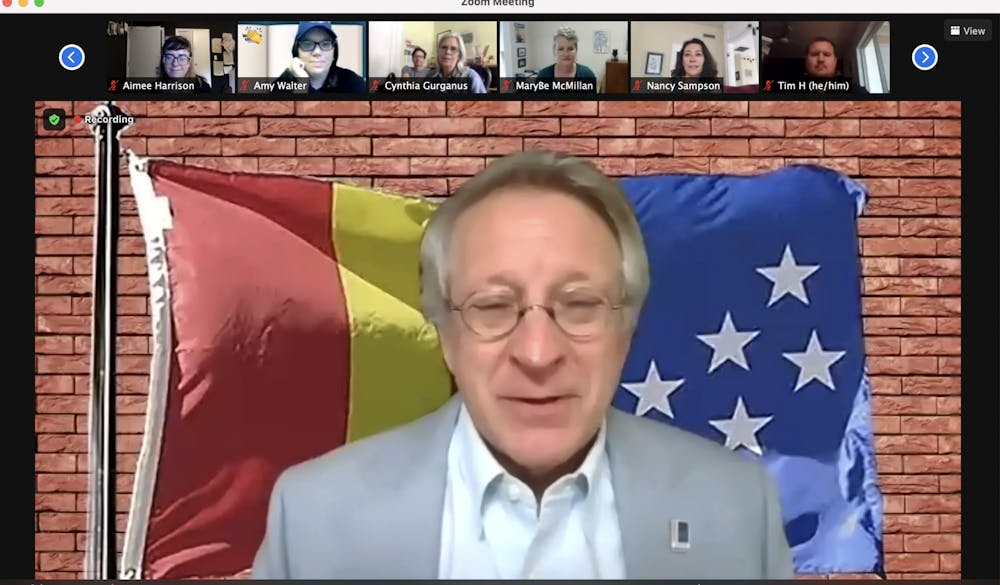Members and allies of the Duke University Press Workers Union came together to express support for the union at a Community Solidarity Speak-Out on Monday, just over a week before union certification will be decided in a formal vote.
The event, which was held over Zoom and attended by over 100 people, featured a DUP employee and author, Durham Mayor Steve Schewel and representatives from several local labor unions.
“[The DUP Workers Union is] important for the publishing industry. It’s important for the South. It’s important for Durham,” Schewel said.
Schewel, Trinity ‘73 and visiting assistant professor in the Sanford School of Public Policy, described his and other Durham residents’ relationships to the University as “complicated,” noting that Duke is the largest employer in Durham.
“There’s so much good that [Duke] provides to so many people. And yet, we know also that Duke sets the wage,” Schewel said. “It sets the wage for this region, for our city, and to win the wages that people deserve, to win the working conditions that people deserve, will make a difference for everybody.”
Conversations among DUP employees about improving working conditions started in 2019, according to Kelsea Smith, an assistant managing editor at DUP. Since then, joining her co-workers in unionization efforts has given Smith a “strong community of connections” to lean on in times of need, such as when she gave birth to her daughter at the start of the pandemic.
During her seven years working at DUP, Smith has seen co-workers leave due to limited opportunities, structural racism that made them unable to continue working, abrupt reorganizations and situations in which “life-altering events could not be accommodated under our current [Family and Medical Leave Act] policies.”
“Our union has not been and never will be a magic wand that automatically transforms our workplace and our lives into a utopian paradise,” Smith said. “It’s just us and we aren’t perfect. We make mistakes and our organizing together has required a lot of hard work, but it’s been worth it because we deserve a say over what happens in our workplace.”
The Chronicle reached out to Director of DUP Dean Smith for comment. He referred The Chronicle to the Concerned DUP Colleagues, a group composed of employees “who have questions about the effort to unionize.”
In response to Kelsea Smith, the employees wrote in an email that while it is “difficult to respond to one’s individual experience,” they “can agree that there have been issues in the past along these lines.”
“The concerns of racism, abrupt (and perhaps unjust) reorganizations, and an unaccommodating approach to life-altering events are related to what we would describe as the "old" organization,” they wrote. “We can agree that advancement is also somewhat limited, which is partly due to the size of our small nonprofit organization.”
The employees added that Dean Smith is “committed to change and actively seeks input from staff at all levels,” as well as supporting equity and inclusion efforts and diversity training for DUP staff.
“Leadership under Smith has not made any restructuring decisions without careful thought about the impact to the Press and its employees as well as communicating openly about the business reasons for those restructures,” they added. “We have a director who is dedicated to improving our culture and has already made necessary changes to benefit all DUP employees.”
Chenjerai Kumanyika, a journalist and an assistant professor at Rutgers University, said that in his experience, most institutions’ commitment to social equity is left to the discretion of managers or policies that “can’t actually deliver the forms of justice that we need.”
“Recognizing workers and institutions negotiating directly with workers is where you get the most powerful and substantive kind of justice,” Kumanyika said.
The Concerned DUP Colleagues wrote that “no concrete steps for how a union contract can more effectively combat social injustice at the Press have been offered” based on the information shared by union organizers.
“The first step is to acknowledge the existence of inequities, which we have done. We (the employees of DUP) are engaged and have a common goal of addressing our challenges, implementing change, and reaching resolution,” they wrote. “It is not an easy task, and can only be accomplished when everyone is dedicated, not divided.”
The Concerned DUP Colleagues also shared a statement by Gisela Fosado, editorial director of DUP, which called for more diversity at DUP.
“We absolutely need more BIPOC coworkers, and especially Black women, at all levels of management,” Folsado wrote. “And we ALL need to do the work of understanding how we individually and collectively perpetuate white supremacy culture here at DUP and beyond.”
Folsado added that the work to change this culture was “frustratingly slow” and that while DUP is not yet where they need to be, “we see that more and more of us are doing the work that we need to do.”
Marybe McMillan, president of the North Carolina State American Federation of Labor and Congress of Industrial Organizations, stated her support for the gathering and expressed that “over 120,000 union members across North Carolina” were also standing in solidarity with the workers’ efforts to unionize.
McMillan pointed out recent union victories in North Carolina, including the formation of the Duke Faculty Union, the first faculty union at a private university in the South, and the unionization of 1800 nurses at Mission Hospital in Asheville last fall, which was thought to be the largest union win in the South in a decade.
“I am confident that [the DUP Workers Union] will make history by organizing the first University press in the South,” McMillan said.
Joseph Winters, an associate professor of religious studies and African and African American studies and a DUP author, compared the DUP Workers Union’s campaign to books on critical theory that DUP publishes.
“Critical theory is always a kind of critique backed by a kind of hope that things could be different,” he said.
To unionize is “to reimagine what it means to be a worker, what it means to be in solidarity with others, what it means to treat somebody with respect and dignity in the workplace,” Winters said. “It seems to me that this is precisely an embodiment of that intersection of the critical but also hope.”
After going public in March, the DUP Workers Union filed for a National Labor Relations Board-conducted election to legally certify the union in May. If a majority of DUP employees vote in favor of unionizing, the NLRB will certify the union. Voting will take place between 12 and 1 p.m. on June 2.
Get The Chronicle straight to your inbox
Signup for our weekly newsletter. Cancel at any time.

Milla Surjadi is a Trinity junior and a diversity, equity and inclusion coordinator of The Chronicle's 119th volume. She was previously editor-in-chief for Volume 118.

